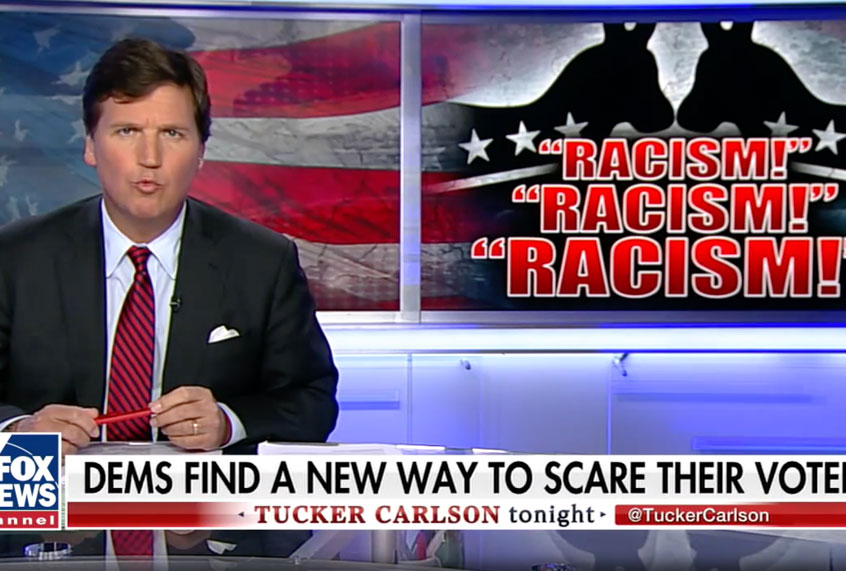On the air this week, Fox News host Tucker Carlson accused Democrats and the left of using the white nationalist label to assail political opponents and score policy victories.
“Nobody likes racists. Nobody wants to be called a racist. The left knows that, so they use the word as a cudgel to beat their political opponents into submission and have their way,” Carlson said, referring to the term “white nationalism.”
“They have done this so often and for so many years that over time with the word ‘racist’ has lost a lot of power. It is dulled from overuse. The left needs a new attack line, a new way to make you shut up and obey,” he continued. “Now, they found one. Watch former Georgia politician Stacey Abrams deploy it against White House advisor Stephen Miller.”
The Fox News host then played a clip of Abrams, a rising star in the Democratic Party and a possible 2020 presidential candidate, accusing the Trump administration aide of supporting white nationalist ideology. Miller is known for pushing hardline immigration reform measures, including the president’s infamous “Muslim ban” and the administration’s policy of separating migrant families at the U.S.-Mexico border, that critics have called racist.
“I believe that what we have seen from Stephen Miller is vestiges of white nationalism,” Abrams says in the clip, echoing comments made by some congressional Democrats, including Reps. Ilhan Omar of Minnesota and Mark Pocan of Wisconsin.
Carlson then asked, “White nationalism — let’s be literal for a minute. What is that, exactly?”
“Abrams did not say, she does not have to say. The phrase hits you in the gut, not the head. It evokes images from a nightmare — detention camps, deportation trains, mass killing,” the conservative pundit continued. “It is terrifying. You would rather be called a cannibal then a white nationalist — and of course, that is exactly the point. That’s why they say it.”
Carlson then showed several clips of various media and political pundits denouncing Miller as a “white nationalist.”
“You’ll notice that none of these dumb people pause even for a second to explain to you what a white nationalist is,” he said. “You probably still don’t know and neither do we. And, honestly, that’s because there are so very few of them in this country. There are probably about as many legitimate white nationalists in America as there are Russian spies.”
“You could live your entire life here without running into a white nationalist,” Carlson continued. “No matter what they tell you, this is a remarkably kind and decent country.”
“Attacking people for their race is exactly how you destroy a country,” he argued. “That’s what Democrats are doing. They know that they are doing it, it’s obvious they just don’t care.”
Although Carlson attempted to play down the threat of white nationalism in the United States, research by the nonprofit advocacy group the Southern Poverty Law Center found 1,020 hate groups operating across the country in 2018 — a 30 percent increase since Trump launched his presidential campaign in 2015 and a record high. The center said most hate groups across the country espoused some form of white supremacist ideology, including neo-Nazis, the Ku Klux Klan, neo-Confederates and white nationalists, and revealed the number of white nationalist groups rose by almost 50 percent in 2018 — from 100 to 148. It argued Trump has “given voice to the rage and paranoia of white supremacists.”
Additionally, a poll conducted last month in the wake of a mass shooting at two mosques in the New Zealand city of Christchurch revealed that just 19 percent of U.S. adult citizens think the president rejects white nationalism. Thirty-nine percent of respondents said that the commander in chief, in fact, supports white nationalism, while 20 percent said the president does not have a strong opinion on the movement either way. An additional 21 percent said they were unsure. The apparent New Zealand gunman posted an online manifesto praising Trump as “a symbol of renewed white identity and common purpose” and referred to immigrants as “invaders within our lands.”
Trump offered his “warmest sympathy” and “best wishes” to New Zealand following the massacre, but did not specifically express condolences to the Muslim community in New Zealand or deliver any message of empathy or support to Muslims in the U.S., even as mosques around the country increased security measures as a result of the attacks. The president also said he does not believe white nationalism is rising and becoming a widespread threat around the world, even as some Democrats criticized him for failing to condemn white nationalism and Islamophobia and suggested the president’s incendiary language bears some responsibility for the violence.
“I think it’s a small group of people that have very, very serious problems, I guess,” Trump said. “It’s certainly a terrible thing.”


